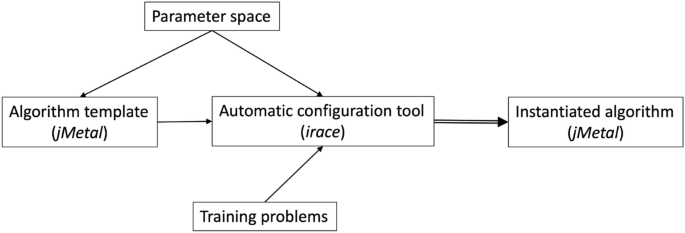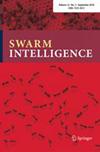On the automatic design of multi-objective particle swarm optimizers: experimentation and analysis
IF 2.1
4区 计算机科学
Q3 COMPUTER SCIENCE, ARTIFICIAL INTELLIGENCE
引用次数: 0
Abstract
Abstract Research in multi-objective particle swarm optimizers (MOPSOs) progresses by proposing one new MOPSO at a time. In spite of the commonalities among different MOPSOs, it is often unclear which algorithmic components are crucial for explaining the performance of a particular MOPSO design. Moreover, it is expected that different designs may perform best on different problem families and identifying a best overall MOPSO is a challenging task. We tackle this challenge here by: (1) proposing AutoMOPSO, a flexible algorithmic template for designing MOPSOs with a design space that can instantiate thousands of potential MOPSOs; and (2) searching for good-performing MOPSO designs given a family of training problems by means of an automatic configuration tool (irace). We apply this automatic design methodology to generate a MOPSO that significantly outperforms two state-of-the-art MOPSOs on four well-known bi-objective problem families. We also identify the key design choices and parameters of the winning MOPSO by means of ablation. AutoMOPSO is publicly available as part of the jMetal framework.

多目标粒子群优化器的自动设计:实验与分析
摘要多目标粒子群优化算法的研究是以每次提出一个新的粒子群优化算法的方式进行的。尽管在不同的MOPSO之间的共性,它往往是不清楚哪些算法组件是解释一个特定的MOPSO设计的性能至关重要。此外,不同的设计可能在不同的问题族上表现最佳,确定最佳的整体MOPSO是一项具有挑战性的任务。我们通过以下方式解决了这一挑战:(1)提出AutoMOPSO,这是一种灵活的算法模板,用于设计具有可实例化数千个潜在mopso的设计空间的mopso;(2)利用自动组态工具(irace)在给定一组训练问题的情况下搜索性能良好的MOPSO设计。我们应用这种自动设计方法来生成一个MOPSO,该MOPSO在四个众所周知的双目标问题族上显著优于两个最先进的MOPSO。并通过烧蚀的方法确定了获胜MOPSO的关键设计选择和参数。AutoMOPSO作为jMetal框架的一部分公开提供。
本文章由计算机程序翻译,如有差异,请以英文原文为准。
求助全文
约1分钟内获得全文
求助全文
来源期刊

Swarm Intelligence
COMPUTER SCIENCE, ARTIFICIAL INTELLIGENCE-ROBOTICS
CiteScore
5.70
自引率
11.50%
发文量
11
审稿时长
>12 weeks
期刊介绍:
Swarm Intelligence is the principal peer-reviewed publication dedicated to reporting on research
and developments in the multidisciplinary field of swarm intelligence. The journal publishes
original research articles and occasional review articles on theoretical, experimental and/or
practical aspects of swarm intelligence. All articles are published both in print and in electronic
form. There are no page charges for publication. Swarm Intelligence is published quarterly.
The field of swarm intelligence deals with systems composed of many individuals that coordinate
using decentralized control and self-organization. In particular, it focuses on the collective
behaviors that result from the local interactions of the individuals with each other and with their
environment. It is a fast-growing field that encompasses the efforts of researchers in multiple
disciplines, ranging from ethology and social science to operations research and computer
engineering.
Swarm Intelligence will report on advances in the understanding and utilization of swarm
intelligence systems, that is, systems that are based on the principles of swarm intelligence. The
following subjects are of particular interest to the journal:
• modeling and analysis of collective biological systems such as social insect colonies, flocking
vertebrates, and human crowds as well as any other swarm intelligence systems;
• application of biological swarm intelligence models to real-world problems such as distributed
computing, data clustering, graph partitioning, optimization and decision making;
• theoretical and empirical research in ant colony optimization, particle swarm optimization,
swarm robotics, and other swarm intelligence algorithms.
 求助内容:
求助内容: 应助结果提醒方式:
应助结果提醒方式:


